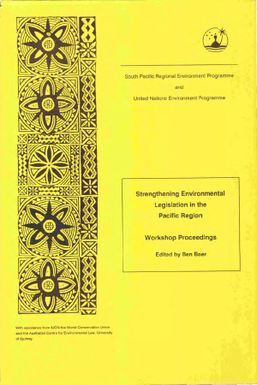Workshop Proceedings
- Description:
- This workshop on environmental law was the first of its kind in the Pacific region It was a natural follow-on from the work that has been carried out by the Regional Environment Technical Assistance Project and the National Environmental Management Strategy Project, both of which are producing National Environmental Management Strategies and Legal Reviews of a dozen countries in the Pacific. The workshop also followed hard on the heels of the United Nations Conference on Environment and Development (the UNCED Conference), to which international, regional and national environmental law proved to be a central and essential element. Because it followed so closely after the UNCED Conference, the workshop enabled a discussion of the many global issues which were fresh in the minds of many of the participants and presenters, which were brought down to a regional and more local level. This was particularly the case in relation to the question of appropriate mechanisms for the achievement of sustainable development.
- Display date:
- 1993
- Collections:
- Secretariat of the Pacific Regional Environment Programme (SPREP)
- Publisher:
- Secretariat of the Pacific Regional Environment Programme (SPREP)
- Content partner:
- Secretariat of the Pacific Regional Environment Programme (SPREP)
- Availability:
- Not specified
-
Copyright status: All rights reservedFind out more about what you are able to do with this itemThis item is all rights reserved, with means you'll have to get permission from Secretariat of the Pacific Regional Environment Programme (SPREP) before using it. For more information, please see our use and reuse page.What can I do with this item?Non-infringing useNZ copyright law does not prevent every use of a copyright work, and this item may be hosted by an international institute or organisation. You should consider what you can and cannot do with a copyright work.No sharingYou may not copy and/or share this item with others without further permission. This includes posting it on your blog, using it in a presentation, or any other public use.No modifyingYou are not allowed to adapt or remix this item into any other works.No commercial useYou may not use this item commercially.
Related items
Welcome and warm Pasifik greetings
The information on this site has been gathered from our content partners.
The names, terms, and labels that we present on the site may contain images or voices of deceased persons and may also reflect the bias, norms, and perspective of the period of time in which they were created. We accept that these may not be appropriate today.
If you have any concerns or questions about an item, please contact us.
